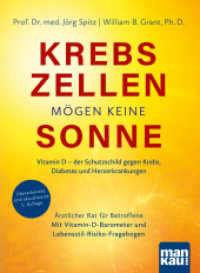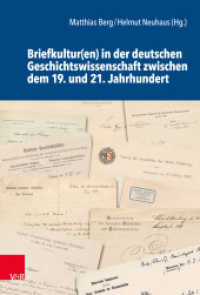Full Description
Disability Psychotherapy explores the growing practice of working psychotherapeutically with people with disabilities.
Over three parts, the book explores the history of disability psychotherapy, working as a disability psychotherapist and applications of disability psychotherapy. The contributors, representing a range of approaches, describe the practice of disability psychotherapy through clinical material, discuss their experiences of working in the field and reflect on their learnings. The book also considers the contributions of the Institute of Psychotherapy and Disability, and how relational attachment work with patients, colleagues, research and clinical writing creates a thriving community.
Disability Psychotherapy will be of interest to experienced and student psychotherapists, psychoanalysts, counsellors, educators, carers, parents, advocates and anyone who is concerned about widening access for people with disabilities and their networks to high quality psychotherapy treatment.
Contents
Disability Psychotherapy: What It Is and Why It Matters
Angelina Veiga and Valerie Sinason
SECTION A: History of Disability Psychotherapy
1. Implications for Training: How the Principles of Disability Psychotherapy Can Be Integrated Into Mainstream Psychotherapy Training
David O'Driscoll
2. Three Magnificent Women and One Lovestruck Man: The Professionalism of Disability Psychotherapy
Brett Kahr
3. How Working with Disabled People Can Make Us Better Psychotherapists
Shula Wilson
SECTION B: Working as a Disability Psychotherapist
4. Du sei wie Du about Love and Passion
Johan De Groef
5. Seeking Custody, Post Custody: Applying Disability Psychotherapy Thinking in the Criminal Justice System
Richard Curen
6. The Respond Model of Disability Psychotherapy: The Attachment-Based Systems Approach
Noelle Blackman, Jess Lammin, Jasmine Hill, and Rosie Creer
7. From Trauma to Creative Integration: Disability Psychotherapy and the Evolution of a Systemic Model of Trauma Treatment for Vulnerable Children and Adults
Eimir McGrath
8. Becoming a Disability Psychotherapist
Angelina Veiga
SECTION C: Applications of Disability Psychotherapy
9. Understanding the Effects of Trauma in People with Intellectual Disability: Looking at Diagnosis of Post Traumatic Stress Disorder
Georgina Parkes
10. Relationship, Imagination, Justice and Hope: Throughlines in Child Psychotherapy, Trauma, Learning Disability and Social Exclusion
Tasmin Cottis
11. In Search of Eclecticism as a Means to Navigate the Complexities of Disability Psychotherapy
Nancy Sheppard
12. Treating Psychosis with Respect: Including the Contribution of Dr Phoebe Caldwell
Elspeth Bradley
13. Therapy with Dr Alan Corbett
François Marshall and Marvin Marshall-Springer
Epilogue
Valerie Sinason








